"I Couldn't Sit, Stand, or Sleep": What It's Really Like to Have Endometriosis

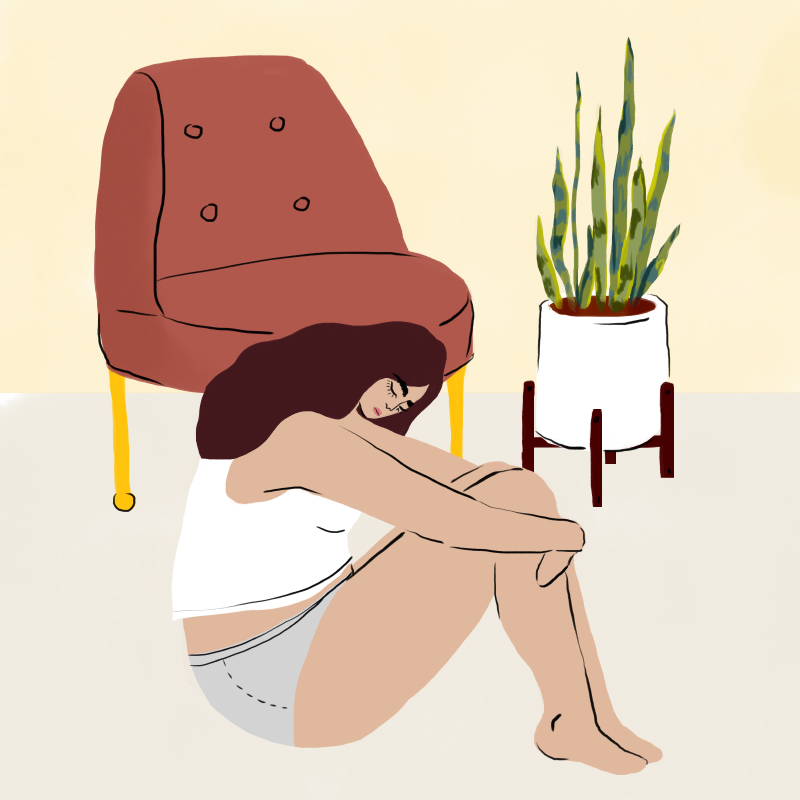
The conversation around female reproductive health is changing, sure—namely, in that we're actually talking about it at all. But how much time will it take for women to unravel the centuries of society-imposed shame projected onto their bodies? Think about it: We've only just started worrying about the toxic ingredients lurking in our tampons over the last few years—before that, many of us probably weren't even aware that this was something worth considering.
At best, this deep-seated stigma keeps us less informed than we should be. At worst, it deters those who suffer from painful and abnormal symptoms from seeking the medical help they need—and even shames them for being sidelined by said symptoms in the first place. This seems to be a theme with endometriosis, a condition in which tissue that normally lines the uterus grows outside of it. Often, women who suffer from endometriosis go for years without a proper diagnosis; they chalk up their debilitating pain and extreme bleeding to bad periods instead of endometriosis symptoms.
That's why we need to talk about it—not just for the sake of normalizing talk around our reproductive health in general, but also with the hope that women in pain might suddenly find some clarity and seek the help they need and deserve. With that in mind, we asked four women with endometriosis to share their stories: the terrifying symptoms, the surgeries, how they manage it all, and everything else in between.
Their names have been changed, but their accounts are honest, brave, and incredibly eye-opening. Keep reading to see what life with endometriosis is really like.
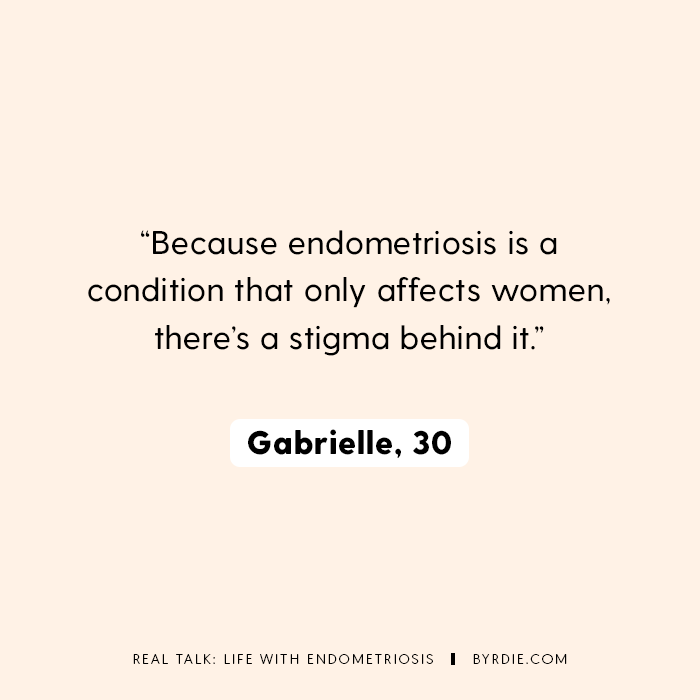
"I got my period on my 10th birthday. Happy birthday to me, right? By 13, I was on birth control after being diagnosed with dysmenorrhea and menorrhagia (which lead to a short bout of anemia). By 20, I was on a multitude of painkillers, had tried every birth control under the sun, endured countless ultrasounds and tests, and had already experienced one ruptured ovarian cyst in high school.
"I was told by countless doctors that this was 'normal' and that my pain would alleviate with age and birth control, but it never did. A few years ago, I was at my breaking point. After trying everything except for the Lupron Depot injection (because I was 25 years old and the thought of going through a temporary menopause lasting six months was not an option), I decided to have a laparoscopy, and that’s when I was officially diagnosed.
"It's crazy to think that at the 'young' age of 30, I've already had to deal with this for 20 years. It was only this year that I started to feel like I finally have some control over my endometriosis. Early last year, I had a large fluid-filled cyst rupture and was bedridden for three days. Shortly after that, I suffered from a case of dysfunctional uterine bleeding caused by a change in my birth control and bled for 32 days straight.
"It was then that I realized that I needed to attack endometriosis on a daily basis and not just when I was in pain. I started taking Motrin 800mg a few days before I knew I'd get my period, and that helped. When my endometriosis flares up and I'm in unbearable pain and bedridden, I take Tramadol. I started reading up on endometriosis and made several lifestyle changes. I've been on a plant-based diet for a few months and that has drastically helped, not only with my endometriosis but with my migraines as well. I still have bad days, but it pales in comparison to what I experienced in my teens and 20s.
"The crazy thing about endometriosis is that what it feels like and what you look like just doesn't correlate. If I walk by someone, they would just think I am a normal, healthy woman. My insides may feel like someone is constantly stabbing my abdomen and I'm in so much pain that I can't function, but I don't look 'sick.' My symptoms include severe cramping, excessive clotting, and back and knee pain, and I break out in red blotches all over my chest, neck, and sometimes stomach. These symptoms aren’t exclusive to my period. It’s an everyday battle and each day is different.
"Because endometriosis is a condition that only affects women, there's a stigma behind it. Even though it's 2017, it's still sometimes awkward to explain it to people, especially men. The look of terror that splashes on my boss's face whenever I mention anything to do with my period is enough for me (and most women) not to want to talk about it. I'm the only woman in my department, and I constantly feel that my co-workers think that I don't take my job seriously because I'm out sick. I've been called to our HR office over my sick days and have had to provide doctor's reports as proof just to keep my job.
It makes me feel ashamed because I've always excelled and I've always been a hard worker, but this is something that is completely out of my control and that scares me. For a long time, I felt like I was just a weak girl. The friend who was called a flake for bailing on plans or being antisocial and locking myself in my room. I allowed people's opinions to make me feel inferior because I had let this condition control every aspect of my life—my grades, my attendance, my jobs, my social life, my sex life… everything.
"Growing up, there wasn't a lot of material on the subject, and I felt very lost, hopeless and alone. That's why I think it's really great that a lot of female celebrities have come out and openly talked about their battle with endometriosis and are raising awareness." — Gabrielle, 30
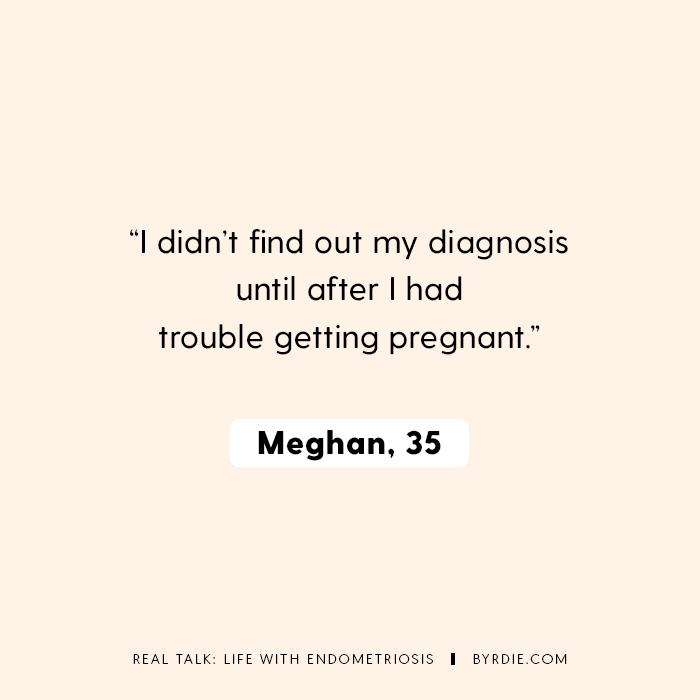
"I had been trying for two years, and my doctor suggested surgery to look for endometriosis, even though I didn't have the 'typical' pain symptoms associated with it. So I had laproscopic surgery, and they found quite a bit of endometriosis. I then moved straight to IVF to have the best chance of conceiving (and we got my daughter out of that).
"For me, the main symptom was infertility. And even after surgery to remove the endometriosis, it grows back. So I had to have a second surgery to remove it and go through IVF again after it grew back. So it definitely impacted when we had children and the spacing between the children. Pregnancy keeps the endometriosis from growing, so for me, the closer together in time my pregnancies were to the surgeries and to each other, the better chances I had of conceiving.
"I think the thing that was most surprising to me about endometriosis was how different it can look and how differently it affects people. The much more typical presentation is pain, and I know for some of my friends, it's debilitating pain. For me, there was no pain, but I had infertility. And doctors have told me that the 'amount' of endometriosis a person has does not correlate to symptoms—even if they find a lot during surgery, you could still have mild symptoms or vice versa." — Meghan, 35
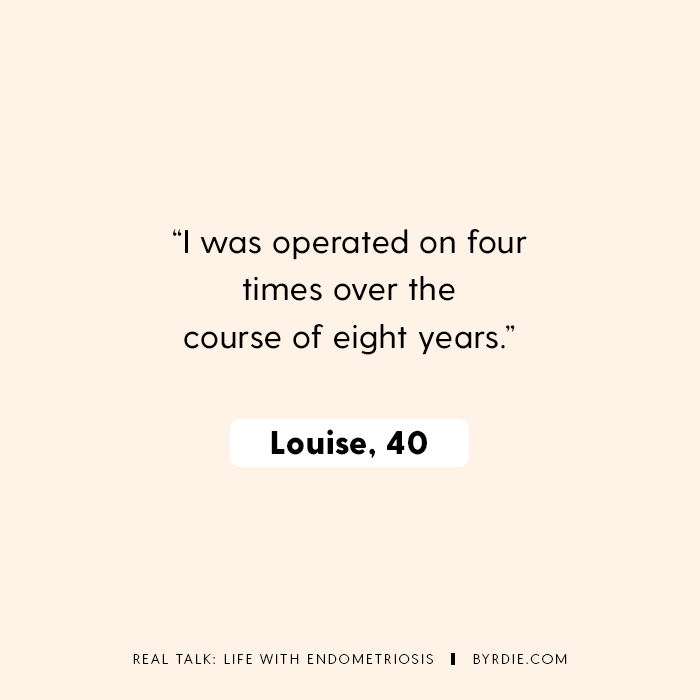
"I was 23 and went to get birth control pills, and the doctor thought I was pregnant. She took an ultrasound and found a 12x10-centimeter ovarian cyst. The only symptom had been super-painful periods. There is also history of endometriosis in our family.
"I got the cyst surgically removed, but instead of endoscopy, they had to open me up and took my whole left ovary. When the endo was being suppressed with hormones, I had long good periods when there was hardly any other pain than during my period. There was spotting every now and then for no reason and terrible constipation (my intestines were covered in 'wood-like growth' said the operating doc).
"At its worst, I was at the ER in the middle of the night crying because I couldn't sit, stand, or sleep. I was going through IVF treatments to get pregnant at the same time—no luck with that. I was operated on four times over the course of eight years, the last of which was a hysterectomy at age 32. Now I have been pain-free for eight years and use hormone patches as if I'm going through menopause.
"If it runs in your family, don't take a break—stay on the pill. Get a good doctor and good painkillers (have painkillers with you always). Your body is fighting you. It will be super hard to get pregnant, but many are lucky. Exercise helps. Talk to your partner! And get a heating pad—that helps when the pain is really bad." — Louise, 40
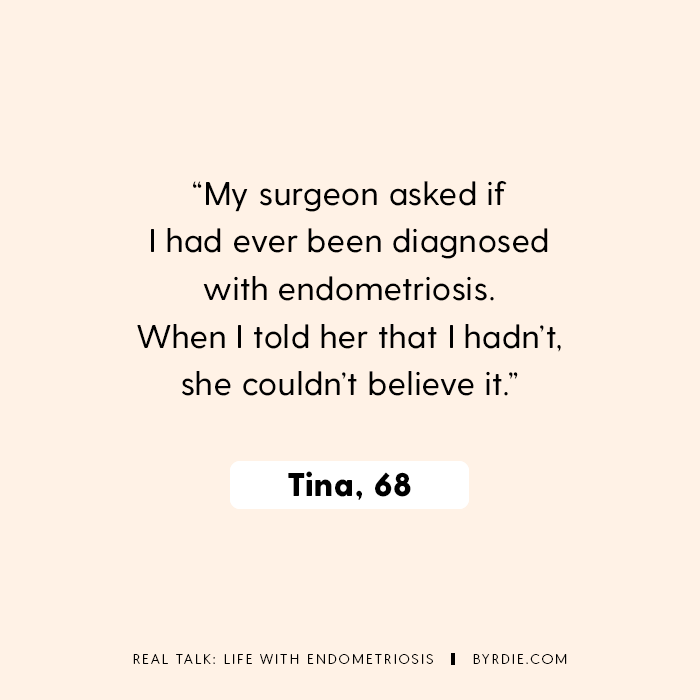
"I never knew I had it. I never had the typical symptoms of heavy, painful periods. I also never tried to become pregnant, so that wasn't an issue. I found out I had endometriosis in 2007. I had surgery for ovarian cancer, and after surgery, my surgical oncologist asked if I had ever been diagnosed with endometriosis.
"When I told her that I hadn't, she couldn't believe it. She said it was all over my peritoneum. Because I had my uterus, ovaries, fallopian tubes, appendix, gall bladder, most of my abdominal fascia, and lymph nodes removed, I wouldn't have to worry about it. The only thing I can think of to explain it is that I have a very high pain threshold.
"I was up walking the night I had surgery and went home in two days. My abdominal suture line is 16 inches long. The only pain I had was back pain because my surgery took six hours. So I was very fortunate in that I never went through what others went through." — Tina, 68
These stories are not intended to substitute for medical advice. If you suspect that you might have endometriosis, please consult your doctor.
Next up: Meet the two women who started the tampon revolution.
This story was published at an earlier date and has since been updated.
This article is provided for informational purposes only and is not intended to be used in the place of advice of your physician or other medical professionals. You should always consult with your doctor or healthcare provider first with any health-related questions.
